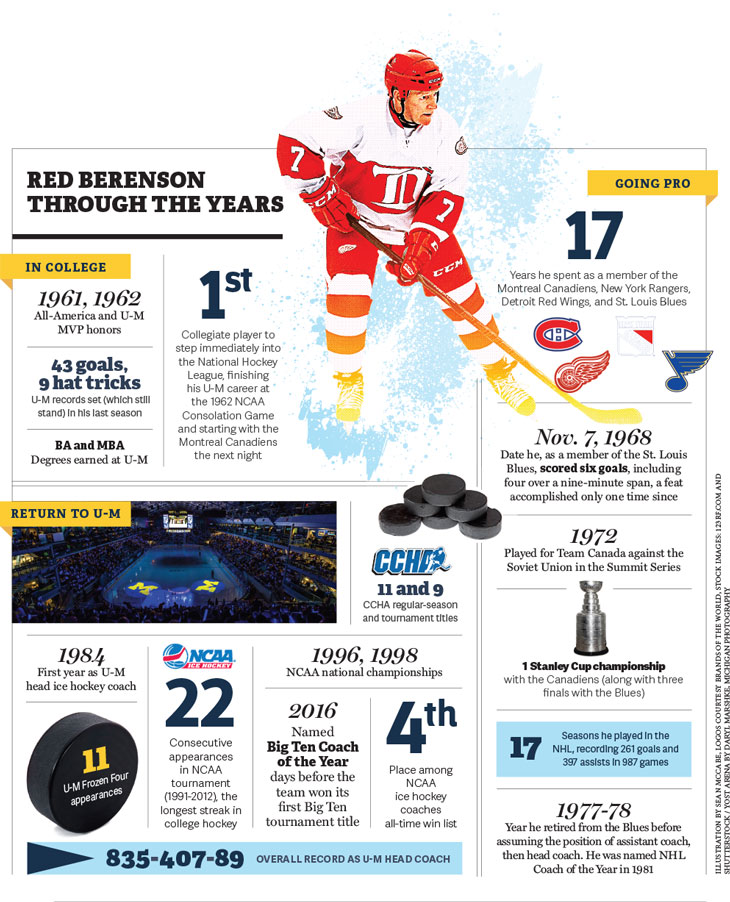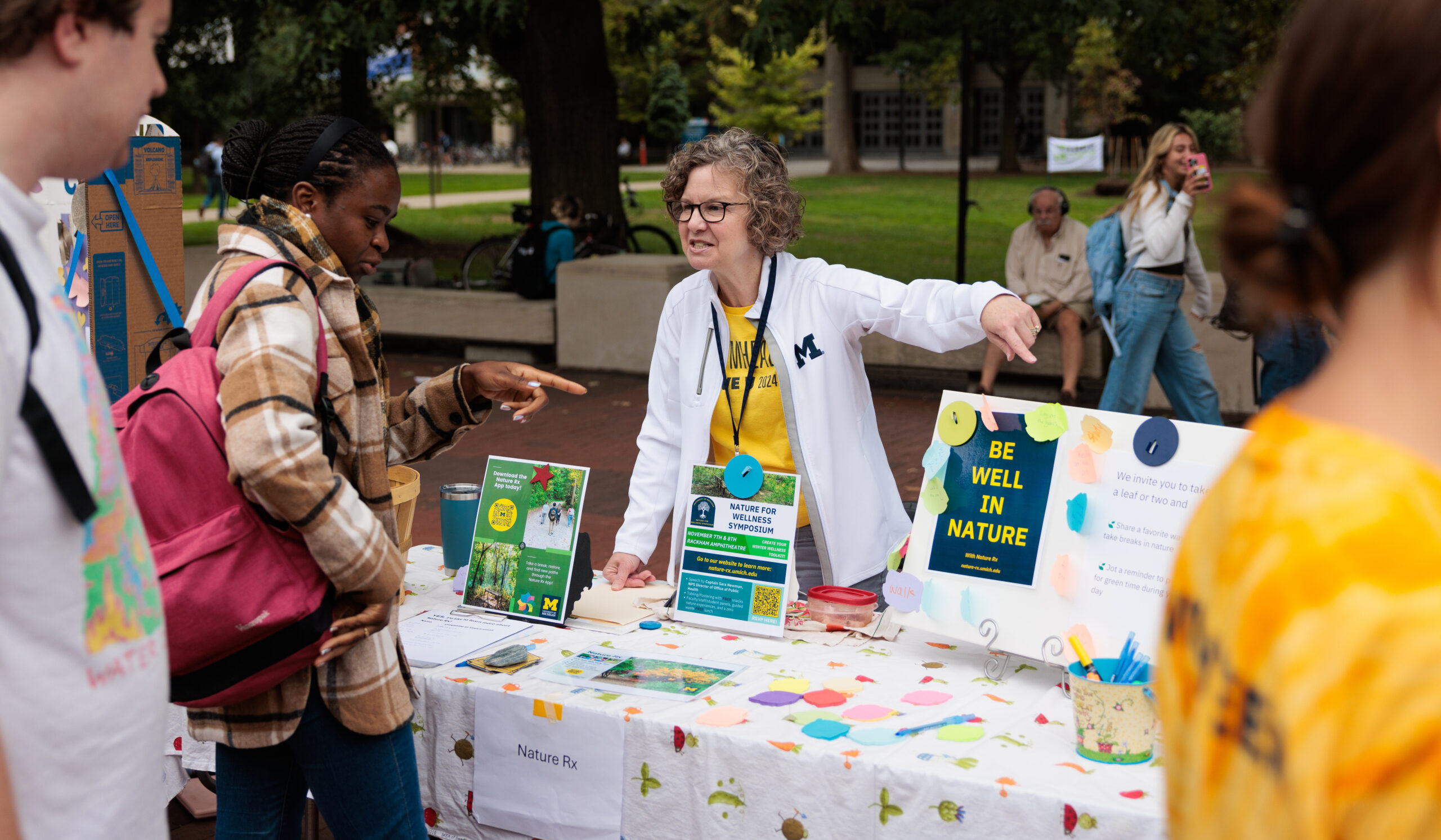It’s a Friday night at Yost Ice Arena, and the barn-like rink is full of sound. The Hockey Band enthusiastically blares “The Victors.” The Children of Yost get the crowd fired up. Lights dim, and sharp skate blades can be heard digging into the ice as the U-M hockey team glides out.
Little noticed amid the hubbub are three men in navy suits who also step onto the ice, making their way around the boards to the Michigan bench.
One of them — tall, lanky, paying little attention to the cacophony around him — is Gordon Arthur “Red” Berenson, ’62, MBA’66, the coach of Michigan hockey for the past 32 years. He takes his spot in the center of the bench, behind the players, clutching a clipboard and watching the action in deep concentration.
“I didn’t know I was going to be a coach. I had no aspirations to be a coach, but I knew that someday I would be a manager or a boss.” —Red Berenson
When a player scores a goal, it’s the assistants, not Berenson, who exchange high fives with them. When a perplexing penalty is called, Berenson does not berate the referee, leaving the shouting to the men beside him.
“I’m delegating,” said Berenson, 76. “I’m giving my coaches a chance to coach; I’m more of a CEO now than I am a coach.” And little wonder. He earned his bachelor’s and his MBA from U-M’s business school, knowing his classes would benefit him whether or not he played professional hockey.
“I didn’t know I was going to be a coach,” Berenson said. “I had no aspirations of being a coach, but I knew that someday I would be a manager or a boss.” He took a keen interest in management, taking courses in real estate, finance, marketing, and manufacturing.
It wasn’t clear he would need them in 1962, when Berenson headed straight from his undergraduate commencement to the Montreal Canadiens, becoming the first player to go directly from college to the National Hockey League.
Montreal picked up the rights to sign Berenson during his high school years in Saskatchewan, but he chose to attend Michigan rather than turn pro, departing from from the typical path for other young Canadian hockey stars of the era.
Berenson doggedly remained a Wolverine despite the Canadiens’ continual warnings that his decision could backfire. “They kept telling me, ‘You’ll never be a pro, you’ll never play professional hockey, you’ll never make a living if you stay in school.’
“But I said to myself, ‘If I’m going to make it, I’m going to make it, whether I go to school or not.’”
Once in the NHL, he gained another distinction, becoming one of just three players at the time to wear a helmet on the ice. Although he’d worn one throughout his four years at Michigan, he’d started his professional career bareheaded. But in one of his early games, he suffered what he realized was a concussion when his head slammed against the glass surrounding the rink during a game. Berenson then asked the equipment manager to get him a helmet.
“To succeed as a coach, you have to be as hungry as you were as a player . . . Red is one of the few, taking this job as seriously as he did playing.”— John U. Bacon
“People asked, ‘Why are you wearing a helmet?’ I told them, ‘Because I don’t want to have to wear one.’ I never took the helmet off after that.”
In 1965, the Canadiens won the Stanley Cup, and, again, Berenson’s professional and academic lives collided. “I went from the parade straight to my graduate school classes the next day. I felt pretty good about that. That was the ultimate feeling,” Berenson recalled. “I was just a young kid, but I listened to people who said, ‘You go to school; you don’t want to be a hockey bum.’ I had my head screwed on straight.”

His playing career lasted until 1978, and then Berenson successfully became the head coach of the St. Louis Blues, winning the Jack Adams Award as the NHL coach of the year in 1981. Fired after the next season, the opportunity then arose in 1984 to take charge at Michigan. Berenson took it, and was never tempted to leave, although he has had many chances to do so.
“The NHL didn’t have any magic for me,” Berenson said, recalling an offer from the New York Rangers, where he had played two seasons. “I told the manager, ‘Have you ever been to Ann Arbor?’ He said, ‘Oh yeah, I love Ann Arbor.’ I said, ‘Well, so do I, and I’m not coming back to New York.’”
It was obviously fate. Berenson is only the fourth coach in NCAA Division I men’s hockey to win 800 games. Banners from his championship teams hang across the rafters across Yost, making it nearly impossible to capture all of them in a single photo without a panorama feature on your mobile phone. To put Berenson’s longevity into perspective, there have been six Michigan head football coaches in the time that he has served as the head ice hockey coach.
Sports writer and commentator John U. Bacon, ’86, MA’94, sees parallels — in philosophy, not temperament — between Berenson and legendary football coach Bo Schembechler.
“You peel back the first layer, and the similarities between Red and Bo are many: hard work and team work are rewarded. The team comes before the individual. And both are highly competitive men who are willing to lose a game if it means doing the right thing and benching a star,” Bacon said. “While Red’s style is not everyone’s style — especially in hockey — you can’t say it hasn’t worked.”
While a half century has gone by since he played at U-M, Berenson does not feel a generation gap, which he credits to his players.
“They can still relate to me, and I can still relate to them,” he said. “When I started here, I was 45, they were 20. They’re still 20 and I’m 76. I realize there will be a time when a younger man in leadership takes over. But in the meantime, they’ve been really good with me.”
Bacon said one reason for the camaraderie is that Berenson’s players know that he, like current Michigan head football coach Jim Harbaugh, ’86, once was in their position. “To succeed as a coach, you have to be as hungry as you were as a player — and most great players simply aren’t that hungry once they retire. Red is one of the few, taking this job as seriously as he did playing,” Bacon said.
Berenson, coaching his final games of the 2015-16 season, looked like he had at least a few years left. At practice one Saturday in March, he skated easily onto the ice, beginning with that running step many hockey players use, no matter their age.
And at the team’s annual banquet on April 3, he put to rest any rumors of retirement, saying he had spoken with Michigan’s new athletic director, Warde Manuel, ’90, MSW’93, MBA’05, and let him know he wanted to continue coaching.
“This season has been inspiring for our team, our staff and the fans. Our success has been the motivation to return to help the program take another step forward,” Berenson said at the banquet. And with that announcement, Berenson will return for his 33rd season.
An earlier version of this story referred to the Children of Yost as the “Maize Rage.”
Micheline Maynard is the senior editor of NPR’s “Here & Now,” the daily news program heard by 4 million listeners. She was Detroit bureau chief for The New York Times and a Knight-Wallace Fellow at Michigan in 1999-2000.






